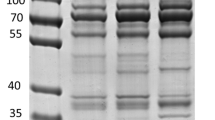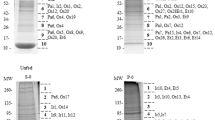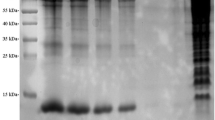Abstract
The majority of ixodid ticks display host-specificity to varying extents. Feeding on different hosts affects their development and reproduction. Consequences can be analyzed at the level of the egg, as it is the initial stage of tick development. Tick egg proteins are abundant and diverse, providing nutrients for embryonic development. However, studies on tick egg profiles are scarce. In this study, we aimed to analyze whether feeding Haemaphysalis qinghaiensis ticks on the yaks (Bos grunniens) and domestic sheep (Ovis aries) has an impact on the variety and variability of the egg proteome. Detached engorged females were used to lay eggs, which were then collected, dewaxed, and subjected to protein extraction. The extracted egg proteins were enzymatically digested using Filter-Aided Sample Preparation (FASP), and the unique peptides were separated and detected by Liquid Chromatography-tandem Mass Spectrometry (LC–MS/MS). The MS data were searched against the previously constructed whole tick transcriptome library of H. qinghaiensis, and the UniProt database for the identification of tick-derived egg proteins. The analysis revealed 49 and 53 high-confidence proteins identified in eggs collected from B. grunniens (EggBg) and O. aries (EggOa), respectively. Of these, 46 high-confidence proteins were common to both egg types, while three were unique to EggBg and seven to EggOa. All the identified proteins mainly belonged to enzymes, enzyme inhibitors, transporters, and proteins with unknown functions. The differential abundance analysis showed that nine proteins were significantly more present in EggBg, while six were significantly more present in EggOa. Overall, enzymes were the most diverse group, while vitellogenin (Vg) was the most abundant. Blood meal uptake on different hosts has a certain effect on the egg proteome composition and the abundance of some proteins, but it may also lead to compensation of protein roles.





Similar content being viewed by others
Data availability
Not applicable.
References
Andreotti R, Malavazi-Piza KC, Sasaki SD, Torquato RJ, Gomes A, Tanaka AS (2001) Serine proteinase inhibitors from eggs and larvae of tick Boophilus microplus: purification and biochemical characterization. J Protein Chem 20(5):337–343. https://doi.org/10.1023/a:1012242817869
Arrieta MC, Leskiw BK, Kaufman WR (2006) Antimicrobial activity in the egg wax of the African cattle tick Amblyomma hebraeum (Acari: Ixodidae). Exp Appl Acarol 39(3):297–313. https://doi.org/10.1007/s10493-006-9014-5
Beys-da-Silva WO et al (2020) Updating the application of Metarhizium anisopliae to control cattle tick Rhipicephalus microplus (Acari: Ixodidae). Exp Parasitol 208:107812. https://doi.org/10.1016/j.exppara.2019.107812
Blisnick AA, Foulon T, Bonnet SI (2017) Serine Protease Inhibitors in Ticks: An Overview of Their Role in Tick Biology and Tick-Borne Pathogen Transmission. Front Cell Infect Microbiol 7:199. https://doi.org/10.3389/fcimb.2017.00199
Boctor FN, Kamel MY (1976) Purification and characterization of two lipovitellins from eggs of the tick. Dermacentor Andersoni Insect Biochemistry 6(3):233–240. https://doi.org/10.1016/0020-1790(76)90088-3
Boudida Y et al (2016) Serine Protease Inhibitors as Good Predictors of Meat Tenderness: Which Are They and What Are Their Functions? Crit Rev Food Sci Nutr 56(6):957–972. https://doi.org/10.1080/10408398.2012.741630
Cecerska-Heryć E, Surowska O, Heryć R, Serwin N, Napiontek-Balińska S, Dołęgowska B (2021) Are antioxidant enzymes essential markers in the diagnosis and monitoring of cancer patients - A review. Clin Biochem 93:1–8. https://doi.org/10.1016/j.clinbiochem.2021.03.008
Cheng R, Li D, Duan DY, Parry R, Cheng TY, Liu L (2023) Egg protein profile and dynamics during embryogenesis in Haemaphysalis flava ticks. Ticks Tick Borne Dis 14(4):102180. https://doi.org/10.1016/j.ttbdis.2023.102180
Chmelar J et al (2011) A tick salivary protein targets cathepsin G and chymase and inhibits host inflammation and platelet aggregation. Blood 117(2):736–744. https://doi.org/10.1182/blood-2010-06-293241
Chmelař J, Kotál J, Langhansová H, Kotsyfakis M (2017) Protease Inhibitors in Tick Saliva: The Role of Serpins and Cystatins in Tick-host-Pathogen Interaction. Front Cell Infect Microbiol 7:216. https://doi.org/10.3389/fcimb.2017.00216
Coons LB, Lamoreaux WJ, Rosell-Davis R, Tarnowski BI (1989) Onset of vitellogenin production and vitellogenesis, and their relationship to changes in the midgut epithelium and oocytes in the tick Dermacentor variabilis. Exp Appl Acarol 6(4):291–305. https://doi.org/10.1007/bf01193301
Corral-Rodríguez MA, Macedo-Ribeiro S, Barbosa Pereira PJ, Fuentes-Prior P (2009) Tick-derived Kunitz-type inhibitors as antihemostatic factors. Insect Biochem Mol Biol 39(9):579–595. https://doi.org/10.1016/j.ibmb.2009.07.003
Dai SX, Zhang AD, Huang JF (2012) Evolution, expansion and expression of the Kunitz/BPTI gene family associated with long-term blood feeding in Ixodes Scapularis. BMC Evol Biol 12:4. https://doi.org/10.1186/1471-2148-12-4
Fagotto F (1990) Yolk degradation in tick eggs: II. Evidence that cathepsin L‐like proteinase is stored as a latent, acid‐activable proenzyme. Archives of insect biochemistry and physiology 14(4):237–252. https://doi.org/10.1002/arch.940140404
Finley D, Bartel B, Varshavsky A (1989) The tails of ubiquitin precursors are ribosomal proteins whose fusion to ubiquitin facilitates ribosome biogenesis. Nature 338(6214):394–401. https://doi.org/10.1038/338394a0
Galay RL et al (2013) Multiple ferritins are vital to successful blood feeding and reproduction of the hard tick Haemaphysalis longicornis. J Exp Biol 216(Pt 10):1905–1915. https://doi.org/10.1242/jeb.081240
Galay RL et al (2014) Two kinds of ferritin protect ixodid ticks from iron overload and consequent oxidative stress. PLoS ONE 9(3):e90661. https://doi.org/10.1371/journal.pone.0090661
Gao J et al (2008) Cloning and characterization of a cDNA clone encoding calreticulin from Haemaphysalis qinghaiensis (Acari: Ixodidae). Parasitol Res 102(4):737–746. https://doi.org/10.1007/s00436-007-0826-y
Giorgi F, Bradley J, Nordin J (1999) Differential vitellin polypeptide processing in insect embryos. Micron 30(6):579–596. https://doi.org/10.1016/s0968-4328(99)00054-2
Guan R, Hu S, Li X, An S, Miao X, Li H (2022) A TIL-Type Serine Protease Inhibitor Involved in Humoral Immune Response of Asian Corn Borer Ostrinia furnaculis. Front Immunol 13:900129. https://doi.org/10.3389/fimmu.2022.900129
Hajdusek O et al (2009) Knockdown of proteins involved in iron metabolism limits tick reproduction and development. Proc Natl Acad Sci U S A 106(4):1033–1038. https://doi.org/10.1073/pnas.0807961106
Hatta T et al (2010) Leucine aminopeptidase, HlLAP, from the ixodid tick Haemaphysalis longicornis, plays vital roles in the development of oocytes. Parasitol Int 59(2):286–289. https://doi.org/10.1016/j.parint.2010.03.001
Huntington JA (2011) Serpin structure, function and dysfunction. J Thromb Haemost 9(Suppl 1):26–34. https://doi.org/10.1111/j.1538-7836.2011.04360.x
Jennissen HP (1995) Ubiquitin and the enigma of intracellular protein degradation. Eur J Biochem 231(1):1–30
Kelly-Robinson GA, et al. (2021) The Serpin Superfamily and Their Role in the Regulation and Dysfunction of Serine Protease Activity in COPD and Other Chronic Lung Diseases. Int J Mol Sci 22(12). https://doi.org/10.3390/ijms22126351
Kluck GEG, Silva Cardoso L, De Cicco NNT, Lima MS, Folly E, Atella GC (2018) A new lipid carrier protein in the cattle tick Rhipicephalus microplus. Ticks Tick Borne Dis 9(4):850–859. https://doi.org/10.1016/j.ttbdis.2018.03.010
Kuniyori M et al (2022) Vitellogenin-2 Accumulation in the Fat Body and Hemolymph of Babesia-Infected Haemaphysalis longicornis Ticks. Front Cell Infect Microbiol 12:908142. https://doi.org/10.3389/fcimb.2022.908142
Kusakisako K, Morokuma H, Talactac MR, Hernandez EP, Yoshii K, Tanaka T (2020) A Peroxiredoxin From the Haemaphysalis longicornis Tick Affects Langat Virus Replication in a Hamster Cell Line. Front Cell Infect Microbiol 10:7. https://doi.org/10.3389/fcimb.2020.00007
Li Y et al (2009) Experimental transmission of Theileria uilenbergi infective for small ruminants by Haemaphysalis longicornis and Haemaphysalis qinghaiensis. Parasitol Res 104(5):1227–1231. https://doi.org/10.1007/s00436-009-1347-7
Logullo C et al (1998) Isolation of an aspartic proteinase precursor from the egg of a hard tick. Boophilus Microplus Parasitology 116(Pt 6):525–532. https://doi.org/10.1017/s0031182098002698
Luo J, Yin H (1997) Theileriosis of sheep and goats in China. Trop Anim Health Prod 29(4 Suppl):8s–10s. https://doi.org/10.1007/bf02632907
Ma M et al (2016) Biological Parameters of Rhipicephalus (Boophilus) microplus (Acari: Ixodidae) Fed on Rabbits, Sheep, and Cattle. Korean J Parasitol 54(3):301–305. https://doi.org/10.3347/kjp.2016.54.3.301
Marcos I, Ruiz A, Blaschak CJ, Borrego S, Cutting GR, Antinolo G (2000) Mutation analysis of GABRR1 and GABRR2 in autosomal recessive retinitis pigmentosa. J Med Genet 37(6):E5. https://doi.org/10.1136/jmg.37.6.e5
Motobu M et al (2007) Molecular characterization of a blood-induced serine carboxypeptidase from the ixodid tick Haemaphysalis longicornis. Febs j 274(13):3299–3312. https://doi.org/10.1111/j.1742-4658.2007.05852.x
Niu Q et al (2022) Molecular Characterization and Gene Expression Analysis of Aquaporin in Haemaphysalis qinghaiensis. Front Physiol 13:811628. https://doi.org/10.3389/fphys.2022.811628
Parola P (2004) Tick-borne rickettsial diseases: emerging risks in Europe. Comp Immunol Microbiol Infect Dis 27(5):297–304. https://doi.org/10.1016/j.cimid.2004.03.006
Pohl PC et al (2008) An extraovarian aspartic protease accumulated in tick oocytes with vitellin-degradation activity. Comp Biochem Physiol B Biochem Mol Biol 151(4):392–399. https://doi.org/10.1016/j.cbpb.2008.08.008
Qiu ZX, Li Y, Li MM, Wang WY, Zhang TT, Liu JZ (2020) Investigation of three enzymes and their roles in the embryonic development of parthenogenetic Haemaphysalis longicornis. Parasit Vectors 13(1):46. https://doi.org/10.1186/s13071-020-3916-7
Rosell R, Coons LB (1991) Determination of vitellogenin titer in the hemolymph of Dermacentor variabilis (Acarina: Ixodidae) using an indirect enzyme-linked immunosorbent assay. J Med Entomol 28(1):41–44. https://doi.org/10.1093/jmedent/28.1.41
Schechter I, Berger A (1967) On the size of the active site in proteases. I Papain Biochem Biophys Res Commun 27(2):157–162. https://doi.org/10.1016/s0006-291x(67)80055-x
Seixas A et al (2003) A Boophilus microplus vitellin-degrading cysteine endopeptidase. Parasitology 126(Pt 2):155–163. https://doi.org/10.1017/s0031182002002731
Sonenshine DE, Roe RM (2014) Overview: Ticks, People and Animals. In: Sonenhine DE, Roe RM (eds) Biology of Ticks, vol 1, 2 edn. Oxford University Press, Oxford, pp 13–14
Sottrup-Jensen L (1989) Alpha-macroglobulins: structure, shape, and mechanism of proteinase complex formation. J Biol Chem 264(20):11539–11542
Sun L, Wüthrich RP (1999) Molecular identification of a murine ubiquitin/60S ribosomal fusion protein and expression study in mouse kidney. Biochem Genet 37(3–4):139–147. https://doi.org/10.1023/a:1018778320235
Teng KF, Cui YQ (1984) Biological observations and descriptions of immature stages of Haemaphysalis qinghaiensis. Acta Entomologica Sinica 27(3):330–333. https://doi.org/10.16380/j.kcxb.1984.03.014
Tufail M, Takeda M (2008) Molecular characteristics of insect vitellogenins. J Insect Physiol 54(12):1447–1458. https://doi.org/10.1016/j.jinsphys.2008.08.007
Valdés JJ, Moal IH (2014) Prediction of Kunitz ion channel effectors and protease inhibitors from the Ixodes ricinus sialome. Ticks Tick Borne Dis 5(6):947–950. https://doi.org/10.1016/j.ttbdis.2014.07.016
van Gent D, Sharp P, Morgan K, Kalsheker N (2003) Serpins: structure, function and molecular evolution. Int J Biochem Cell Biol 35(11):1536–1547. https://doi.org/10.1016/s1357-2725(03)00134-1
Waxman L, Connolly TM (1993) Isolation of an inhibitor selective for collagen-stimulated platelet aggregation from the soft tick Ornithodoros moubata. J Biol Chem 268(8):5445–5449. https://doi.org/10.1016/s0021-9258(18)53341-x
Wiśniewski JR, Zougman A, Nagaraj N, Mann M (2009) Universal sample preparation method for proteome analysis. Nat Methods 6(5):359–362. https://doi.org/10.1038/nmeth.1322
Xu Z et al (2020) A serpin from the tick Rhipicephalus haemaphysaloides: Involvement in vitellogenesis. Vet Parasitol 279:109064. https://doi.org/10.1016/j.vetpar.2020.109064
Yin H, Schnittger L, Luo J, Seitzer U, Ahmed JS (2007) Ovine theileriosis in China: a new look at an old story. Parasitol Res 101(Suppl 2):S191–S195. https://doi.org/10.1007/s00436-007-0689-2
Yuan GL, et al. (2002) Observations on the life history of Haemaphysalis qinghaiensis. Chinese Journal of Veterinary Science and Technology 32(4):10–11. https://doi.org/10.16656/j.issn.1673-4696.2002.04.003
Zhao Y, Liu L, Liu JB, Wu CY, Duan DY, Cheng TY (2022) Cloning, expression, and function of ferritins in the tick Haemaphysalis flava. Ticks Tick Borne Dis 13(2):101892. https://doi.org/10.1016/j.ttbdis.2021.101892
Funding
This study was supported by the National Natural Science Foundation of China (No. 31372431) and the Natural Science Foundation of Hunan (Changsha, China, 2023JJ30287).
Author information
Authors and Affiliations
Contributions
T-YC, D-M, and Y-L conceived and designed the study and critically revised the manuscript. Y-L and X-YL performed the research. Y-L and R–C analyzed the data. Y-L wrote the paper. T-YC, D-M, and Y-L read and approved the final manuscript.
Corresponding authors
Ethics declarations
Competing interests
The authors declare no competing interests.
Additional information
Section Editor: Van Lun Low.
Publisher's Note
Springer Nature remains neutral with regard to jurisdictional claims in published maps and institutional affiliations.
Supplementary Information
Below is the link to the electronic supplementary material.
Rights and permissions
Springer Nature or its licensor (e.g. a society or other partner) holds exclusive rights to this article under a publishing agreement with the author(s) or other rightsholder(s); author self-archiving of the accepted manuscript version of this article is solely governed by the terms of such publishing agreement and applicable law.
About this article
Cite this article
Li, Y., Cheng, R., Liu, XY. et al. The effect of feeding on different hosts on the egg proteins in Haemaphysalis qinghaiensis tick. Parasitol Res 123, 197 (2024). https://doi.org/10.1007/s00436-024-08211-3
Received:
Accepted:
Published:
DOI: https://doi.org/10.1007/s00436-024-08211-3




